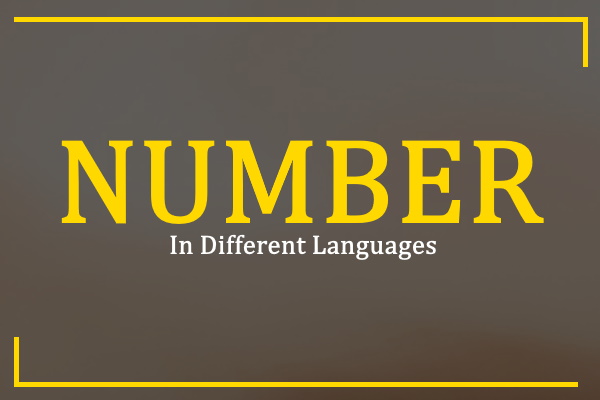Table of Contents
Numbers in Different Languages: A number is an object used for counting, measuring and labeling mathematically. Original examples include natural numbers 1, 2, 3, 4, etc. A written symbol like “5” is called a number. A number system for writing and manipulating this kind of symbol is standardized.
Number in All Languages
Translation of word Number in almost 100+ different languages of the world.
| Different Languages | Word Number |
|---|---|
| Albanian | numër |
| Basque | zenbakia |
| Belarusian | нумар |
| Bosnian | broj |
| Bulgarian | номер |
| Catalan | nombre |
| Croatian | broj |
| Czech | číslo |
| Danish | nummer |
| Dutch | aantal |
| Estonian | number |
| Finnish | määrä |
| French | nombre |
| Galician | número |
| German | Nummer |
| Greek | αριθμός (arithmós) |
| Hungarian | szám |
| Icelandic | Númer |
| Irish | uimhir |
| Italian | numero |
| Latvian | numurs |
| Lithuanian | skaičius |
| Macedonian | број |
| Maltese | numru |
| Norwegian | Antall |
| Polish | numer |
| Portuguese | número |
| Romanian | număr |
| Russian | номер (nomer) |
| Serbian | број (broj) |
| Slovak | číslo |
| Slovenian | številka |
| Spanish | número |
| Swedish | siffra |
| Ukrainian | номер (nomer) |
| Welsh | rhif |
| Yiddish | נומער |
| Armenian | թիվ |
| Azerbaijani | nömrə |
| Bengali | সংখ্যা |
| Chinese Simplified | 数 (shù) |
| Chinese Traditional | 數 (shù) |
| Georgian | ნომერი |
| Gujarati | નંબર |
| Hindi | संख्या |
| Hmong | tooj |
| Japanese | 数 |
| Kannada | ಸಂಖ್ಯೆ |
| Kazakh | нөмір |
| Khmer | ចំនួន |
| Korean | 번호 (beonho) |
| Lao | ຈໍານວນ |
| Malayalam | അക്കം |
| Marathi | संख्या |
| Mongolian | тоо |
| Myanmar (Burmese) | ဂဏန်း |
| Nepali | नम्बर |
| Sinhala | අංකය |
| Tajik | шумора |
| Tamil | எண் |
| Telugu | సంఖ్య |
| Thai | จำนวน |
| Turkish | numara |
| Urdu | تعداد کی |
| Uzbek | soni |
| Vietnamese | con số |
| Arabic | رقم (raqm) |
| Hebrew | מספר |
| Persian | عدد |
| Afrikaans | aantal |
| Chichewa | nambala |
| Hausa | lambar |
| Igbo | nọmba |
| Sesotho | nomoro |
| Somali | tirada |
| Swahili | idadi |
| Yoruba | nọmba |
| Zulu | inombolo |
| Cebuano | gidaghanon |
| Filipino | numero |
| Indonesian | jumlah |
| Javanese | nomer |
| Malagasy | isa |
| Malay | nombor |
| Maori | tau |
| Esperanto | nombro |
| Haitian Creole | nimewo |
| Latin | numerus |
Number in European Languages
Translation of word Number in almost 42 European languages.
| Different Languages | Word Number |
|---|---|
| Albanian | numër |
| Basque | zenbakia |
| Belarusian | нумар |
| Bosnian | broj |
| Bulgarian | номер |
| Catalan | nombre |
| Corsican | numeru |
| Croatian | broj |
| Czech | číslo |
| Danish | nummer |
| Dutch | aantal |
| Estonian | number |
| Finnish | määrä |
| French | nombre |
| Frisian | nûmer |
| Galician | número |
| German | Nummer |
| Greek | αριθμός [arithmós] |
| Hungarian | szám |
| Icelandic | Númer |
| Irish | uimhir |
| Italian | numero |
| Latvian | numurs |
| Lithuanian | skaičius |
| Luxembourgish | Zuel |
| Macedonian | број |
| Maltese | numru |
| Norwegian | Antall |
| Polish | numer |
| Portuguese | número |
| Romanian | număr |
| Russian | номер [nomer] |
| Scots Gaelic | àireamh |
| Serbian | број [broj] |
| Slovak | číslo |
| Slovenian | številka |
| Spanish | número |
| Swedish | siffra |
| Tatar | саны |
| Ukrainian | номер [nomer] |
| Welsh | rhif |
| Yiddish | נומער |
Number in Asian Languages
Translation of word Number in almost 36 Asian languages.
| Different Languages | Word Number |
|---|---|
| Armenian | թիվ |
| Azerbaijani | nömrə |
| Bengali | সংখ্যা |
| Chinese Simplified | 数 [shù] |
| Chinese Traditional | 數 [shù] |
| Georgian | ნომერი |
| Gujarati | નંબર |
| Hindi | संख्या |
| Hmong | tooj |
| Japanese | 数 |
| Kannada | ಸಂಖ್ಯೆ |
| Kazakh | нөмір |
| Khmer | ចំនួន |
| Korean | 번호 [beonho] |
| Kyrgyz | номери |
| Lao | ຈໍານວນ |
| Malayalam | അക്കം |
| Marathi | संख्या |
| Mongolian | тоо |
| Myanmar (Burmese) | ဂဏန်း |
| Nepali | नम्बर |
| Odia | ସଂଖ୍ୟା |
| Pashto | شمیره |
| Punjabi | ਗਿਣਤੀ |
| Sindhi | نمبر |
| Sinhala | අංකය |
| Tajik | шумора |
| Tamil | எண் |
| Telugu | సంఖ్య |
| Thai | จำนวน |
| Turkish | numara |
| Turkmen | sany |
| Urdu | تعداد کی |
| Uyghur | سان |
| Uzbek | soni |
| Vietnamese | con số |
Number in Middle East Languages
Translation of word Number in 4 middle eastern languages.
| Different Languages | Word Number |
|---|---|
| Arabic | رقم [raqm] |
| Hebrew | מספר |
| Kurdish (Kurmanji) | jimare |
| Persian | عدد |
Number in African Languages
Translation of word Number in almost 13 African languages.
| Different Languages | Word Number |
|---|---|
| Afrikaans | aantal |
| Amharic | ቁጥር |
| Chichewa | nambala |
| Hausa | lambar |
| Igbo | nọmba |
| Kinyarwanda | umubare |
| Sesotho | nomoro |
| Shona | nhamba |
| Somali | tirada |
| Swahili | idadi |
| Xhosa | inombolo |
| Yoruba | nọmba |
| Zulu | inombolo |
Number in Austronesian Languages
Translation of word Number in almost 10 Austronesian languages.
| Different Languages | Word Number |
|---|---|
| Cebuano | gidaghanon |
| Filipino | numero |
| Hawaiian | helu |
| Indonesian | jumlah |
| Javanese | nomer |
| Malagasy | isa |
| Malay | nombor |
| Maori | tau |
| Samoan | numera |
| Sundanese | nomer |
Number in Other Foreign Languages
| Different Languages | Word Number |
|---|---|
| Esperanto | nombro |
| Haitian Creole | nimewo |
| Latin | numerus |
Video Translation of Number in 10 Other Languages
Coming Soon…
More Information about Number
A linguistic numeral may refer to a symbol such as 5, words or expression that names a certain number such as “five hundred,” or other words that mean a certain number, such as “dozen.”
A number is a mathematical concept, used for counting or calculating. There are different definitions, depending on the area of math where numbers are used: people use symbols to show numbers; they call numbers.
Common places in which numerals are used include the marking of a unique number which can mark an item, such as telephone numbers, order, serial numbers, or the placing of a single identifier, as in ISBN. In order to measure how many objects are in a given cardinal numbers are used.
The Scale of {A, B, C} is 3. In a set or sequence (first, second, third), ordinal numbers are used to define a certain element.
Numbers are used in the count and calculation of labels (like telephone numbers), for ordering and code (like ISBNs), as well as for counting and measurements.
Used commonly as a symbol, word or sentence, or mathematical object, number may refer to it.
Numbers also have cultural importance all over the world. In Western societies, for example, number 13 is regarded as unlucky, and “a million” can mean “a lot”.
While nowadays it is known to be a quackery, confidence in the mystical significance of numerology impregnated the old and medieval thought. Number 12 is also called one dozen and 20 is called two tens.
Numerology has greatly influenced the growth of Greek mathematics, encouraging work into numerical theory of many problems that are still under consideration.
Number systems are considered very important today. Particular examples of much more general categories include rings and fields.
It is a convention that applies the word “number” without any fundamental importance.
Numbers in different languages has many names. we can make different numbers by adding like add six after one is called 16.

Arslan Hussain, founder of The Different Languages, is an experienced translator passionate about languages and cultures. Through his website, he shares his knowledge and love for different languages, making learning accessible and enjoyable.

